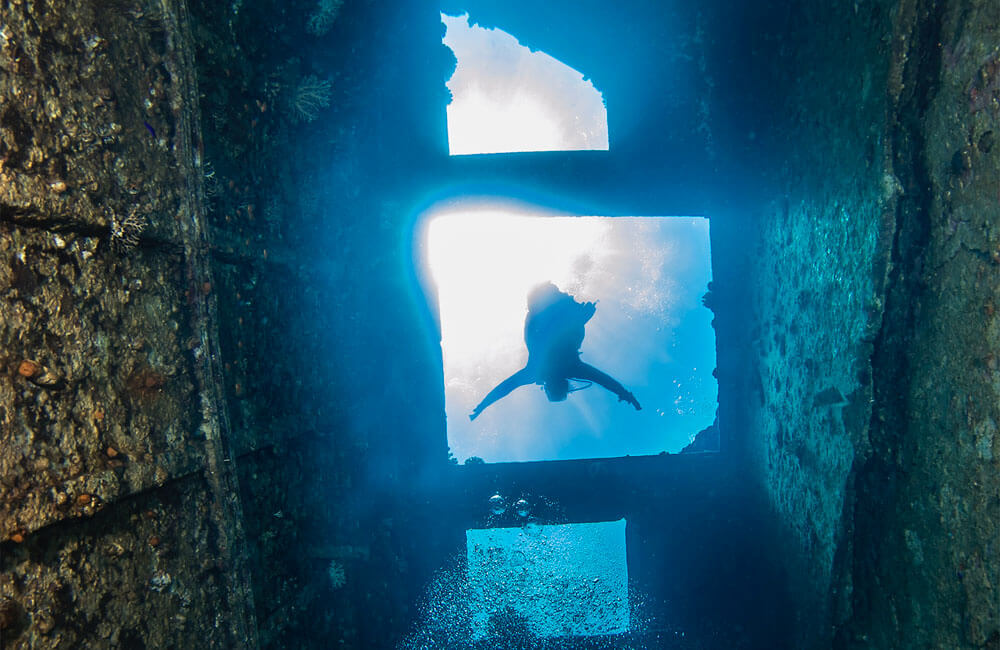
A study into the therapeutic benefits of scuba diving by students from the University of Sheffield’s Medical School has been published this week.
The study is published in the Journal of Disability and Rehabilitation under the title: ‘Can scuba diving offer therapeutic benefit to military veterans experiencing physical and psychological injuries as a result of combat? A service evaluation of Deptherapy UK.’
A research team led by Alice Morgan, with colleagues Harriet Sinclair, Alexander Tan and Ellen Thomas, set out to explore the effectiveness of scuba diving in providing therapeutic and rehabilitative benefit to ex-Service personnel who have experienced traumatic physical and/or psychological injuries resulting from combat.
The study took the form of a service evaluation of Deptherapy, the UK-based charity offering support to military veterans who have experienced life-changing injuries. Deptherapy enables its programme members to earn scuba diving qualifications, alongside a Buddy Peer Support scheme that provides continuing support to veterans involved with the charity.
A total of 15 male veterans were invited to take part in the study, which took place in 2016 but has only just been published. The methodology comprised retrospective and current quantitative measures of mental well-being and functional ability, utilising a General Health Questionnaire and semi-structured interviews with participants, their families and health professionals.
Related articles:

Participants reported an improvement in levels of anxiety, depression and social functioning, as well as a reduction in insomnia, following their involvement in organised scuba diving activities. In particular, the positive perceptions, as indicated from the interviews, were more pronounced in those whose injuries were predominantly psychological, rather than physical.
The study concluded that scuba diving can offer significant therapeutic benefits, particularly for ex-military amputees experiencing co-morbid anxiety and/or chronic psychological adjustment disorders such as PTSD, notably in terms of improvements in social dysfunction and depression.
Until now, medical research into scuba diving as a therapy for injury and disability has been very limited. This study offers both considerable insights into the potential of scuba diving as a therapeutic aid, as well as independent validation of the actual benefits of the Deptherapy Scuba Diving programme, as well as recommendations for further development.
Psychologist and Deptherapy Vice President Richard Castle, who undertook a supervisory role during the study, said: ‘This has been a crucially important piece of research and demonstrates the positive impact that the Deptherapy model can have for ex-Service personnel who have experienced life-changing physical and mental injuries.
‘Crucially, the study also identifies areas where Deptherapy can improve the level of support we offer, and the study recommendations have already been taken forward by the Deptherapy Board. We now need additional resources to monitor the impact going forward, and commission further independent longitudinal research and to widen the evidence base to assess the results of the developments we have initiated.’

Richard Cullen, Chairman of Deptherapy said: ‘I am so glad that Alice Morgan and her team’s paper is now in the public domain. It speaks volumes about our work. At the time of the study we had already become aware of the post-expedition problems that individuals were suffering.
‘We have since developed a first-class Buddy Peer Support Scheme, utilising those of our team who are mental health first aid trained to actively support Programme Members when they return home. This has since expanded into increasingly thorough pre-expedition support. Deptherapy offers 24/7 individual support to all programme members. Mental health and safeguarding those we work with is an absolute priority for the Deptherapy charity.’
Former Royal Engineer and Deptherapy Ambassador Ben Lee is one of the military veterans who has actively benefitted from being introduced to scuba diving through Deptherapy. Double-amputee Ben is currently training to be a Divemaster, and recently won the Royal Foundation’s Endeavour Fund ‘Recognising Achievement’ Award.
‘Scuba diving on the Deptherapy programme has changed my life; I no longer think I can’t do something because of my disabilities, I just jump in and try it,’ said Ben. ‘The visible face of Deptherapy is often people like me, those who have lost limbs through IED explosions in Iraq or Afghanistan. Many people see that as the focus of all our efforts but 80 per cent of our programme members suffer from less visible injuries including PTSD, cancer, multiple sclerosis and blindness.
‘As a trustee of Deptherapy I see the effort that goes into delivering a programme for each individual that is tailored to their specific needs. On behalf of all the Programme Members, I wish to thank the University of Sheffield Medical School for supporting this study and especially to Alice Morgan and her team for a first class insight into what Deptherapy does.’
Details of the full medical study may be found in the Taylor and Francis online academic publishing journal. As a charity, Deptherapy relies on financial support to raise the £1,500 needed to fund a wounded in service veteran on a PADI Open Water course, with at least two applications every week from British Armed Forces veterans who would benefit from their programme. You can learn more about Deptherapy & Deptherapy Education’s programme and its members, and pledge support at www.deptherapy.co.uk.


